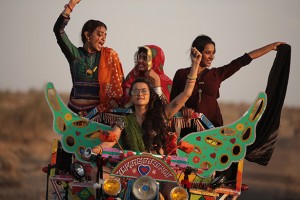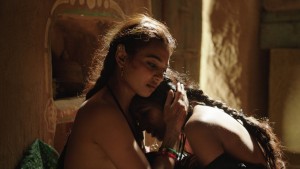By Rahul Desai
(Warning: Mild spoilers ahead…)
Director: Leena Yadav
Even if director Leena Yadav has slightly ‘exoticized’ a world that I — and many other non-native urban millennials — am completely in the dark about, Parched is a fairly good film. It sets out to inhabit an environment far removed from the realms of civilised monsters, courtrooms, rousing monologues and permissions. It is a tough watch, as it should be, despite the filmmaker’s occasional flights of fantasy and cinematic indulgences. Eventually, if I’m being shown a story about a fictitious region with fictitious characters, all that matters by the end is my level of engagement with them: my feelings about their conflicts, their stilted existence, their little moments of relief and joy. Somehow, their inconsistent dialects, the been-there-seen-that syndrome with Tannishtha Chatterjee and rural dramas, the muddled attire, exploitation porn, the overt symbolism — these things stop mattering too much once you start wondering (and guessing) who is going to die first, or what kind of sad/happy route their lives will take.
This means I’m conditioned to a certain sort of region-specific pessimism on screen, and it also means that the current wave of recent ultra-optimistic women’s-empowerment-themed Hindi-language releases have had little effect on my preconceived notions about reality.
Which is why Parched makes for decent ‘cinema.’ It begins with two women, Rani (Chatterjee) and Lajjo (in-form Radhika Apte; her expressions far outweigh the strange noises coming out of her mouth) — rural buddies (I’ll explain why this term) of sorts — both misfits of others’ devices, Rani is a single mother and Lajjo is infertile, taking a windy bus ride to the next village. Rani wants to ‘fix’ on a pretty 15-year-old bride for her annoyingly chauvinistic son. Forget the specifics here. The soundtrack is important: completely at odds with its landscape, a very Bob-Marley-ish drum-beginning leading to a husky buddy-flick rock voice, something that fits more into, say, a forcibly rebellious Angry Indian Goddesses instead. As if to punctuate signs of this loud genre, there’s a shot later of the three in their own Dil Chahta Hai fort pose — an acutely self-aware trifecta — spending a lazy afternoon away from all the claustrophobia. This strange music theme even bookends their journey, the film, culminating what I had initially expected to be an utterly depressing tale of no redemption and little hope.
As it turns out, there were strands of upliftment all throughout, ones that I may have not noticed, but again, I can’t be blamed because it all seemed very ominous for the ladies in question. You see, as a viewer when you see a genuinely joyous scene of liberation and celebration in a film called Parched — in this case, the three buddies (the third being Bijli, a bindaas dancer and a prostitute, enacted by an impressive Surveen Chawla) — years and years of exposure to dramatic storytelling has drilled into you that this happiness is temporary. The laughs will be short-lived. It is inserted only so that the darkness around the corner is amplified. That’s how it usually goes. It happens here, too, as if to bring the three back down to earth every time they dare to let their hair loose. Only, it occurs in repetitive doses, always on the verge of fatality but not quite. The intention here is to build this up in our heads to a crescendo, and hint at the inevitability of how, one day, they may just have enough and go all Mad-Max on their tormentors. But then again, this isn’t a city, and the director isn’t a man.

Every now and then they break free (not quite the same as rebelling) in their own small way: states of mind symbolised by a circus-themed three-wheeled bike they keep galavanting across the arid desert in. As well as an endearing little scene in which they decide to subvert the patriarchal desi-gaali dictionary: no more bhenchod and madarchod; betachod and baapchod works just fine. The juvenile twang in which they break the slang out signifies how even their linguistic mannerisms — in addition to their submissive mindset (Lajjo hasn’t even considered the possibility of her husband being impotent) — is an unfortunate machismo-subset of their testosterone-heavy surroundings. You smile with them, but almost sympathetically, because you know what waits for them back at ‘home’: for Rani, an alcoholic son resentful of her existence; for Lajjo, an alcoholic husband who beats her black and blue for being ‘an empty drum’; for Bijli, supposedly the ‘brave’ one who got away, shady pimps, clients and competition in the form of a younger dancer.
In fact, the reason I perhaps feel invested in the inherently ‘mainstream’ tone of the film is because of some phenomenal scenes: In the film’s most stunning moment, two of them consider kissing one another, topless, bruised and battered, wondering if they’ve reached a stage where the men are so monstrous that even the comforting touch of friendship will do for now…
There’s another one in which one of them bursts into tears when a mysterious man touches her feet before making love to her. She isn’t used to not being used as a plaything, a piece of meat. It’s an overwrought obvious moment, but one that means a lot in context of what this woman is actually trying to achieve.

I can only imagine what’d happen if the three of them met the three ladies from PINK. I suspect Lajjo would’ve laughed her guts out when told by Meenal (Tapsee Pannu, from Pink) how she was almost raped by an entitled rich brat. Almost? For Lajjo, it’s not even rape, it’s just an activity she must participate in to compensate for her ‘defectiveness.’ She would also react in shock, hands on mouth, on discovering that Meenal actually dared to smash a bottle on the man’s face. Theirs would make for an interesting conversation — two different worlds, two different perceptions of misogyny, sexual awakening and assault. What’s also interesting is the diametrically opposite attitudes to two identical characters from both films: in Pink, Andrea, the Meghalaya-born girl who is just “from the North-East” for Delhi folks, is treated as the inferior one (even as far as the length of her role is concerned), the ‘shadier’ one that represents a certain section of the country: those who abandon their own impoverished surroundings to ‘steal’ opportunities in bigger cities. In Parched, a Manipuri woman, the wife of the only sensible man in the village (Sumeet Vyas), is looked at scornfully too — but this time for being educated, an unwelcomed fair-skinned ‘alien’ traveling alone in buses and being able to speak in English. No matter which socioeconomic prism you look at them through, theirs are separate — and equally unfair — losing battles.
Throughout Parched, though, Rani’s predicament, her internal conflict, is the most relevant. She is a woman caught in a vicious cycle of oppression, struggling to swim against the tide. Chatterjee develops that face of sorry reluctance, and again, after Island City, her naivety is meant to be compounded by the presence of an unknown suitor — this time, a random flirty voice on the phone. These convenient tidbits, spurts of forced excitement, fan the final sparks of femininity in her. Naturally, she doesn’t want to subject her own son to the kind of self-defeating premature evolution she had to embrace as a teenager — marrying early, pounding on the wheels of poverty way before adulthood — but she does anyway, to ‘belong’ and have a status, and, again, to compensate for being widowed so early. Perhaps the damage is subconsciously intentional, because she is mother to a male. Her problems aren’t her fault, but she, like Lajjo, isn’t programmed to think any other way. Being a woman is her fault, apparently. Therefore, her relationship with her young daughter-in-law is perhaps the most ‘human’ part of this film: her growing discomfort with her own forced attitude, and the way she recognises the futility of the question, “What will others say?”
One can almost imagine Yadav smirking in the end when Bijli mock-asks her the same question, and the three burst into a fit of cackles. It’s now an inside joke. They’ve gotten here too quickly, too assuredly. And again, on that bike.
After this last month at the movies, I’ve come to feel quite apologetic about being a man. At least there were wiser people (men, ironically) who told the women in Pink that they need not feel apologetic for being girls. The girls in Parched take a long-ish, meandering journey to realise this on their own, too. Nobody tells them, which is why their inevitable epiphany feels a bit staged. The title is almost mischievous, but one can’t help but think it caters to a certain kind of ignorance. Of course, I’m part of that audience.
But how do I get rid of this feeling of being sorry? Maybe I’m not supposed to.
At least not until the next regressive sex comedy hits the screens. After which this apologetic-ness will turn into absolute rage. And fury. And embarrassment. All of which I should have felt in larger doses after every one of these woman-centric films.







Leave A Comment
You must be logged in to post a comment.